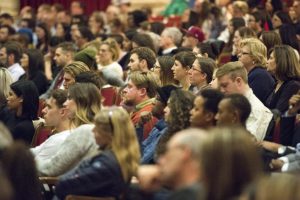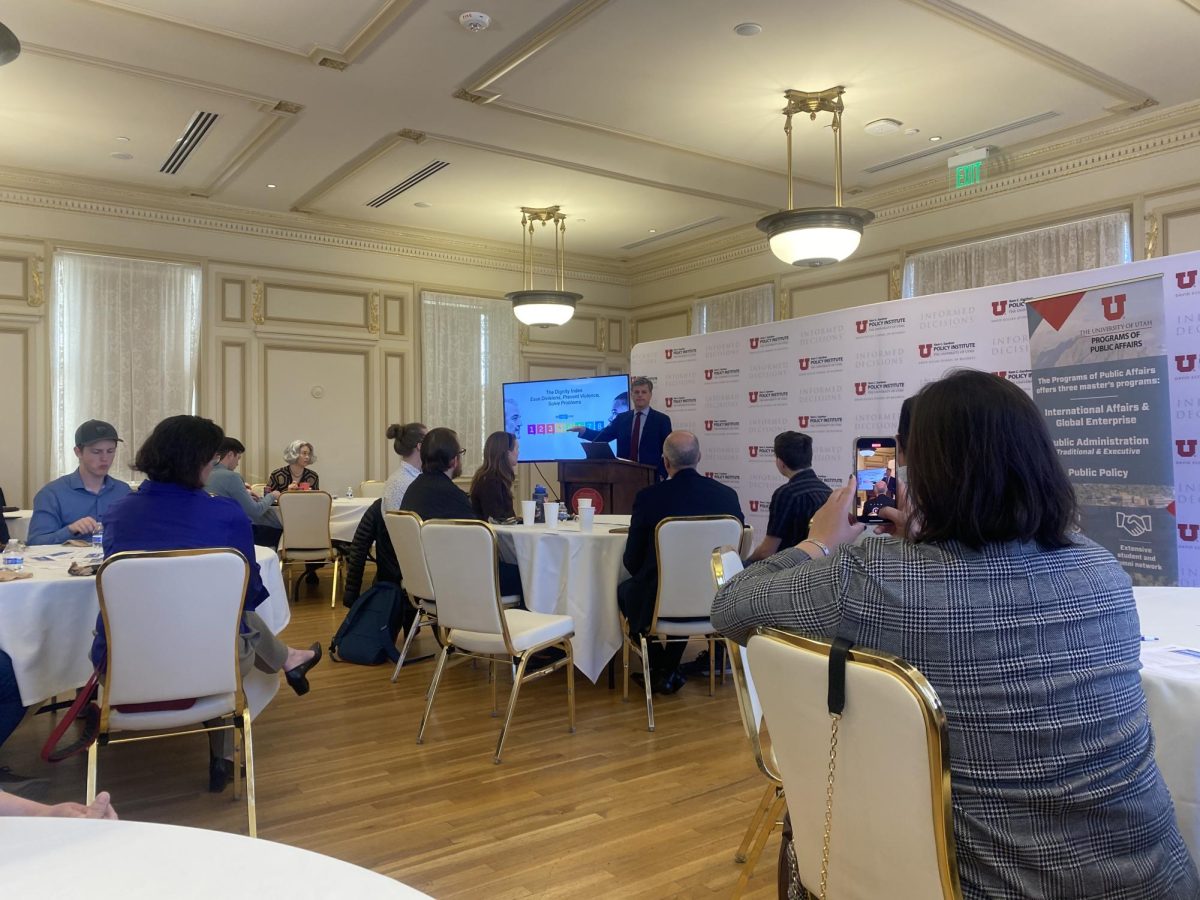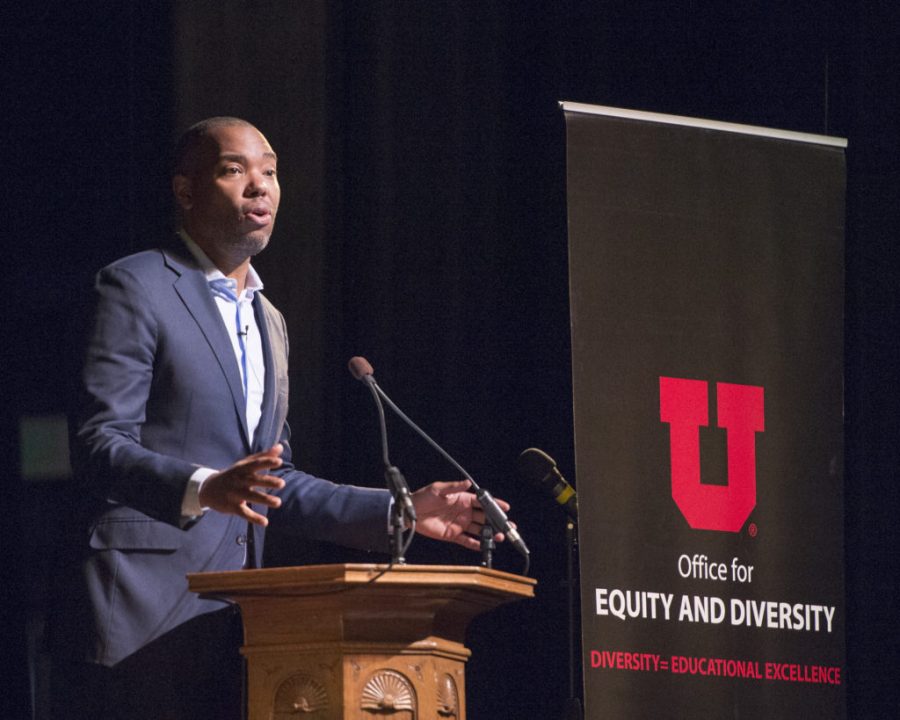Kathryn Bond Stockton, Vice President for Equity and Diversity, opened Wednesday’s Dr. Martin Luther King, Jr. Keynote Address, given by Ta-Nehisi Coates, by reading the poem “First Fight. Then Fiddle.” by Gwendolyn Brooks.
Brooks, the first African American woman to win the Pulitzer Prize for poetry, wrote the poem about finding a peaceful space to play the violin with a deeper meaning in mind. The piece metaphorically confronts the realities of life for African Americans in the United States during the late 1940s and their fight for a place to pursue their passions.
Coates, the 33rd MLK week keynote speaker, was raised in Baltimore by his father — a brief member of the Black Panther Party. He attended the historically black Howard University before leaving school to become a journalist. Coates is now a well-respected correspondent for The Atlantic.
His most famous works include the critically acclaimed article “The Case for Reparations” and the book “Between the World and Me.” He recently wrote the article “My President was Black” after extensive interviews with President Barack Obama. Coates also writes the Black Panther comic books for Marvel, which he called in his speech, “the realization of his dreams as a 9 year-old.”
Coates’ work centers on the experience of being black in the U.S.
Expressing excitement for the opportunity to speak at the U, Coates said the event was important for him “because Utah doesn’t have a reputation for diversity,” and that he wants to take his messages to places where he may not be completely comfortable.
Speaking to a predominantly white audience, Coates said in response to a question that white people “don’t have to apologize [for what they are]. The sincerity of wanting to understand is quite enough…Just read and try to understand.”
Addressing identity politics — a hot topic in today’s political climate — Coates said, “I think [white people] can empathize…I wasn’t part of the Holocaust, but I think I can empathize. I wasn’t a slave, but I think I can empathize.” He said that if people could only empathize with situations similar to their own, no one would be able to empathize with much at all.
Coates’ address focused on the ideas of violence and non-violence. He began by talking about actor and comedian Rob Schneider who, earlier this week, told Representative John Lewis in a tweet not to be angry, but to follow the example of Dr. Martin Luther King Jr. Rep. Lewis knew and worked with King personally during the civil rights movement, even marching to Selma alongside him.

As he explained, Coates didn’t want to talk exclusively about Schneider’s tweet, but about a larger issue — that it’s “common to use Martin Luther King to beat on people who are actually acting in the spirit of Dr. Martin Luther King,” something which “proceeds from a sanitation of Martin Luther King and non-violence itself.”
Reflecting on his roots in Baltimore — a city that was confronted by mass protests and uprisings after the death of Freddie Gray, an African American man being held in police custody — Coates talked about watching this sanitation play out live. Coates watched the portrayal of the uprisings and noticed “what violence [people] saw as worthy of censure and what violence they saw as unworthy of censure.” When it comes to Freddie Gray and others like him, Coates said, “Understand that arrest is violence. It is the taking of your body…Where was the call for non-violence then?” He said, “The system itself tolerates violence toward black people, then turns around” and tells black people to be non-violent.
Coates is getting tired of the tolerance of violence against African American people and intolerance of violence in defense of them. In his address, he discussed how “the very existence of this country is undergirded by violence itself,” pointing to the history of slavery and its role in the American dream and constructing social classes. According to Coates, all of the slaves held in the U.S. in 1860 were worth a combined $3.5 billion — more than the entire U.S. manufacturing industry in that era.
The justification of violence against black people, then and now, is the “notion of black people as criminals,” said Coates. He listed activities that in the past have been considered crimes for African Americans and rights for White Americans, like reading, worshipping without the presence of a supervising white person, walking with a cane and making noise while defending one’s self from assault.
Referring to the use of violence by law enforcement and in the prison system, Coates said, “Why are we willing to tolerate this kind of violence against black people? It’s traditional. It’s in our roots, it’s in our foundations, it’s in our base.”
Attempting to relate his point to the audience, Coates compared the criminal justice system to a hospital. If a patient heard about a mistake made during surgery at a specific hospital, they may still go to that hospital, he explained. If a patient heard about a surgical mistake that had been made at a hospital and the entire hospital system covered up that mistake, however, it would be reasonable for them to mistrust that hospital and avoid it. Similarly, Coates said, some people have lost trust in law enforcement and “don’t view [them] as legitimate.”
Coates finished the speech by advocating non-violence for everyone, saying “Non-violence isn’t just for black people. Non-violence isn’t just for weak people…We are being depraved by our tolerance for violence.”
@EliseAbril
















